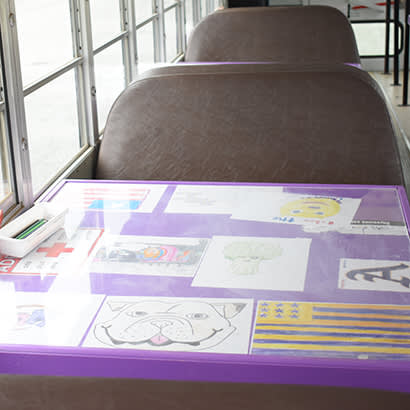
Each year, park and recreation agencies help to provide free meals and snacks through federal nutrition programs like the Summer Food Service Program (SFSP), National School Lunch Program (NSLP), and the Child and Adult Care Food Program (CACFP). These meals help to fill an important gap in those critical out-of-school and summer hours, when families may not be able to provide healthy and filling meals to children. During the academic year, millions of children receive these free or reduced meals at school, but during the summer, the number of children receiving healthy meals drops to just 12.5% of the eligible population.
Studies have shown that one of the main reasons for this decrease in participation is transportation barriers. So often, children lack a safe way to physically get to a summer recreation site, where they can eat healthy meals, participate in physical activity, and engage in social and emotional connections with their peers. School buses don’t run in the summer, leaving that option off the table, and caregivers are not always available to transport children due to work schedules.
And in rural areas, this issue is compounded. Park and recreation agencies are not always located in a central part of the community, leaving families without cars or public transportation without a means of joining programs.
But solutions exist! Communities across the country are working together to provide safe ways to transport kids to meal sites, ensuring they have what they need to succeed.
In Illinois, coordinators help to publicize the free rides youth receive from Effingham County Public Transit (ECPT) to SFSP sites operated by a local nonprofit, Mission: Summer Fun (MSF). MSF contracts with the transit agency to transport youth to meal sites and community programs, at no cost to the youth. Rides are paid for by MSF, which raises funds in the community to cover its costs. Parents are required to contact ECPT to discuss their child’s need for a ride and to give permission for the child to participate in the program. Multiple stops are made throughout the community to pick up and transport children to sites.
In Huntsville, Alabama, the Huntsville City School District approached the city’s Public Transportation Division to see if they could find a way to transport kids who received meals during the academic year at schools to meal sites through the summer. The two agencies, with strong support from the mayor, partnered to distribute specially designed bus passes children could use on a fixed-route shuttle service to get to meal sites for breakfast, lunch, and dinner. Passes were distributed to youth under age 18 during the final week of school and to youth and their parents at SFSP sites. The transit agency funds the passes out of the city budget; the school district administers the outreach and all other aspects of the meals program.
Starkville, Mississippi, helped ensure all children received the meals they needed this past summer by partnering with the local community college. Agency leaders noticed that shuttles owned by the college weren’t being used over the summer, since classes weren’t in session. They approached school officials, and developed an agreement to use the shuttles to provide transportation to kids from across the community to the agency for summer programs and meals.
And in Arkansas City, Kansas, agency leaders grew their on-site program to include a mobile feeding unit, designed to meet kids where they were. Understanding there were issues in transportation and safe access to meal sites, Arkansas City converted an old school bus to a mobile feeding center, bringing healthy meals and fun to neighborhoods across the county.
For more information on working through transportation barriers to meal programs, visit the National Center for Mobility Management.
